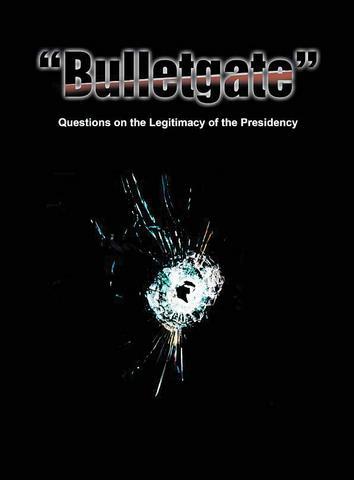The Chinese Nationalist Party (KMT) launched a campaign in Washington last month to challenge the legitimacy of President Chen Shui-bian's (陳水扁) re-election, government sources told the Taipei Times.
"The KMT's representative in Washington, Jason Yuan (袁健生), mailed a 20-page booklet entitled Bulletgate to every US senator and House representative last month," the source said. "The pan-blue alliance is obviously intending to attach the `Taiwan issue' to the US presidential election."
The booklet lists pan-blue alliance suspicions relating to the election, including suggestions that the assassination attempt on March 19 was staged by Chen, that the ballot-counting process was fraudulent and that the referendum held on election day was a trick to evade the law.

The booklet also alleges that a "national security mechanism" triggered after the shooting prevented many soldiers from returning home to vote, and that illegal radio stations spread rumors that the shooting was a pan-blue alliance conspiracy.
"The mysterious shots caused a groundswell of sympathy votes for the pan-green ticket," the booklet says.
On May 20, the day of the presidential inauguration, advertisements without attribution ran in English-language newspapers referring to "Bulletgate" and inviting readers to call a telephone number for more information. The Bulletgate booklet was then sent to those callers who left their details.
The source said that a number of US congresspeople friendly to Taiwan transferred the booklet to Taiwanese officials.
"[The congresspeople] were surprised that Taiwan's opposition would try to spoil the country's democratic achievement," the source said.
A National Security Council official told the Taipei Times yesterday that the council had not received any report on the matter from the Taipei Economic and Cultural Representative Office, Taiwan's de facto embassy in the US.
But such a campaign could only harm the nation's image as well as the reputations of opposition politicians, the official said.
"It is a pity that the entire opposition alliance continues to wallow in the swamp [of losing]," the official said. "Its leaders are unable to look ahead, instead stalling at the day of [the presidential election]."
Su Chi (蘇起), former Mainland Affairs Council chairman during KMT rule and now a top international liaison aide to KMT Chairman Lien Chan (連戰), confirmed that the National Policy Foundation, a KMT think tank, had produced Bulletgate and sent it to Yuan.
"We authorized Yuan to deal with the document. Now we are just in charge of collecting data and updating the latest situation in Taiwan into the booklet," Su said.
"At the very least, Yuan has sent the letter twice to every US congressmen since June," he said.
Su stressed that many friends in foreign countries were concerned about the nation's democracy and wanted to understand what happened during the presidential election. Therefore, he said, the KMT had to provide an account of it to the international community.
"We hope that the US heavyweights will not just listen to remarks that are made by the Chen administration," Su said.
Asked if the letter would meet the alliance's expectations of bringing pressure to bear on Chen's administration from overseas, Su said that his organization was not capable of tracking the reactions of every US congressman.

An essay competition jointly organized by a local writing society and a publisher affiliated with the Chinese Communist Party (CCP) might have contravened the Act Governing Relations Between the People of the Taiwan Area and the Mainland Area (臺灣地區與大陸地區人民關係條例), the Mainland Affairs Council (MAC) said on Thursday. “In this case, the partner organization is clearly an agency under the CCP’s Fujian Provincial Committee,” MAC Deputy Minister and spokesperson Liang Wen-chieh (梁文傑) said at a news briefing in Taipei. “It also involves bringing Taiwanese students to China with all-expenses-paid arrangements to attend award ceremonies and camps,” Liang said. Those two “characteristics” are typically sufficient

A magnitude 5.9 earthquake that struck about 33km off the coast of Hualien City was the "main shock" in a series of quakes in the area, with aftershocks expected over the next three days, the Central Weather Administration (CWA) said yesterday. Prior to the magnitude 5.9 quake shaking most of Taiwan at 6:53pm yesterday, six other earthquakes stronger than a magnitude of 4, starting with a magnitude 5.5 quake at 6:09pm, occurred in the area. CWA Seismological Center Director Wu Chien-fu (吳健富) confirmed that the quakes were all part of the same series and that the magnitude 5.5 temblor was

The brilliant blue waters, thick foliage and bucolic atmosphere on this seemingly idyllic archipelago deep in the Pacific Ocean belie the key role it now plays in a titanic geopolitical struggle. Palau is again on the front line as China, and the US and its allies prepare their forces in an intensifying contest for control over the Asia-Pacific region. The democratic nation of just 17,000 people hosts US-controlled airstrips and soon-to-be-completed radar installations that the US military describes as “critical” to monitoring vast swathes of water and airspace. It is also a key piece of the second island chain, a string of

The Central Weather Administration has issued a heat alert for southeastern Taiwan, warning of temperatures as high as 36°C today, while alerting some coastal areas of strong winds later in the day. Kaohsiung’s Neimen District (內門) and Pingtung County’s Neipu Township (內埔) are under an orange heat alert, which warns of temperatures as high as 36°C for three consecutive days, the CWA said, citing southwest winds. The heat would also extend to Tainan’s Nansi (楠西) and Yujing (玉井) districts, as well as Pingtung’s Gaoshu (高樹), Yanpu (鹽埔) and Majia (瑪家) townships, it said, forecasting highs of up to 36°C in those areas